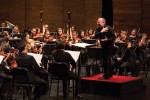Title
Unfamiliar Beethoven? Not really, but at its season opener, the Juilliard Orchestra is slated to play a slightly different ending to the slow movement of the "Pastoral" Symphony. The concert will be conducted by Nicholas McGegan, who'll also lead a series of Juilliard415 concerts in November. One of the world's foremost Handel specialists (but also happy to conduct and perform contemporary music), McGegan chatted with The Journal about the advantages of working with students and this month's eyebrow-raising Beethoven moment. Click here to see a video of parts of this interview.
Body
What might you say to students that you wouldn't to seasoned professionals?
You have to be very careful with professionals—they can be very touchy. When Mozart went to Paris he was alarmed to realize that every single member of the orchestra was wearing a sword—which certainly affected his conducting technique.
I think you have a function when you're working with students to explain very clearly not only what you want but also why you want it. With a professional orchestra, there isn't the time necessarily, so you tend to say, 'I want this like this.' Only if there's time do you say the reason you want it. [With students], I tell stories about the composer—how he came to write the piece, what he thought about, why we're sitting in a funny way, or using a particular bowing or a particular tempo. So they actually get some education slipped in with the musicmaking.
Tell us about the program.
One of the most enjoyable things that I do is to make music by very well-known composers but, as the Food Channel would say, "with a twist." Beethoven actually wrote two endings for the slow movement of the "Pastoral" Symphony. The first one is what we [always] play. The second one was because he decided he didn't like the first one. So he wrote it and sent it to the publishers, and they said, 'Oh, I'm sorry, it's already gone to press.' So we don't actually perform the ending Beethoven really wanted, making this something that maybe some of the audience will not have heard. It's only one extra bar, but why not, for a piece that gets played somewhere in the world almost every day, do something slightly different with it? I'm also going to observe Beethoven's metronome marks up to a point, using a very classy edition that has what he actually wrote. Or at least what we think he wrote. Beethoven was a very messy boy! He had terrible handwriting, unlike Mozart, whose manuscripts were clear as day. But this will be a little bit of musicology that might pique the interest of the student musicians and the audience.
And Mozart's Bassoon Concerto [which is also on the program] I actually did at Juilliard before [in 2009]. Not only is it a wonderful piece, but it's an opportunity for a student to play a concerto with the orchestra—and that's an incredibly exciting thing. Because you know that those students are going to be playing the concerto here and I might meet them in five years when they're the principal bassoon of a major symphony orchestra somewhere in the world. It's incredibly inspiring that the future of classical music is in the hands of these brilliant young people.





